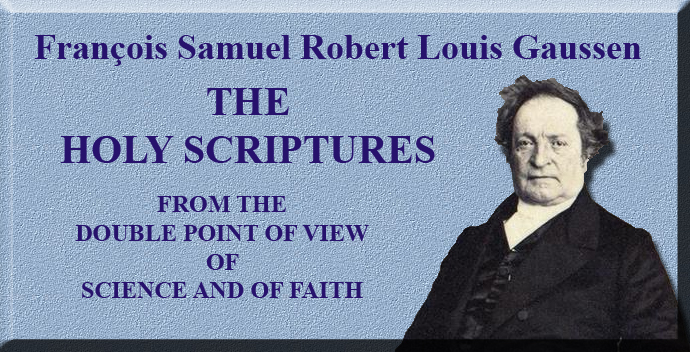
The Holy Scriptures
From the Double Point of View of Science and of Faith
By François Samuel Robert Louis Gaussen
Part Second - The Method of Faith
Book 1 - The Two Methods Open for the Knowledge of the Canon
Chapter 3
|
THE ADVANTAGES OF THE METHOD OF FAITH. 416. THE method of faith, on the contrary, by requiring you to study profoundly the divine facts recorded in the Word in order to find your proofs, far from giving birth to doubts in your progress, will every day increase your motives for gratitude, and furnish fresh subjects of admiration. Instead of taking no notice of the constant agency of God in the Church, as you are constrained to do by the other method, — instead of dispensing with the’ promises of Christ to His people, and His powerful interventions to give them the Bible, and to preserve or to restore it, — instead of dispensing with this very simple argument, that the canon of the Old Testament never had a history, and yet all the saints before Jesus Christ had good reasons for receiving it as divine, — instead of putting aside the superhuman effects which these holy books have accomplished in the world through every age, rendering themselves a testimony of what they are; — this method of faith, far from regarding as nothing these testimonies of God, contemplates and admires them, and, while confirming the canon to you in so many ways, at the same time establishes your soul on “the foundation of the apostles and prophets, Jesus Christ himself being the chief corner-stone,” (Eph. ii. 20.) This method of faith contemplates the incessant and manifestly divine agency which for twenty-three centuries made use of the Jewish people, though almost always rebellious, to preserve the canon of the Old Testament free from all admixtures. He who guarded it for twenty-three centuries, it tells you, will not fail to guard the canon of the New Testament to the end by the Christian Church. He, of whom it is said, after His ascension to heaven, that He still “laboured with His apostles” in their most distant proclamations of the gospel, “working with them, and confirming the word with signs following,’ (Mark xvi. 20,) — He is not dead!. No! it is “He who is alive,” (Rev. i. 18;) and if He has promised to be with them to “the end of the world,” (Matt. xxviii. 20,) — that is, not with their persons, but no doubt with their testimony, and consequently with their books, — He has not failed, and will not fail, to keep His promise, by defending His Church against the gates of hell; nor will He allow those gates to prevail against the sacred books which have given it birth, and which sustain its life. How can the elect be saved if they do not believe? the method of faith asks; and how can they believe if the truth is not preached? and how can the truth be preached if the books which contain it are not given to us? and how can they be given if they are not preserved? God, then, in promising that His Church shall never perish, promises also that His word shall never pass away. Sooner should heaven and earth pass away! Such are the thoughts and the confident expectations of faith in relation to the canon. 417. In the foregoing lines we have somewhat anticipated what must be demonstrated in the sequel, as far as relates to what we call the scriptural doctrine of the canon; but we wish only to make it understood that this method of faith, the simplest and the shortest for establishing the certainty of the canon, is also unquestionably the most beneficial and the surest. Yet, before coming to this doctrine, we must state what appears to us the true and legitimate use of science in the determination of the canon.
|
|
 |
 |
|
|
|
-
Site Navigation
 Home
Home What's New
What's New Bible
Bible Photos
Photos Hiking
Hiking E-Books
E-Books Genealogy
Genealogy Profile
Free Plug-ins You May Need
Profile
Free Plug-ins You May Need
 Get Java
Get Java.png) Get Flash
Get Flash Get 7-Zip
Get 7-Zip Get Acrobat Reader
Get Acrobat Reader Get TheWORD
Get TheWORD